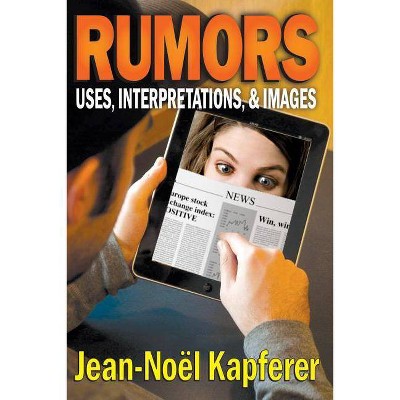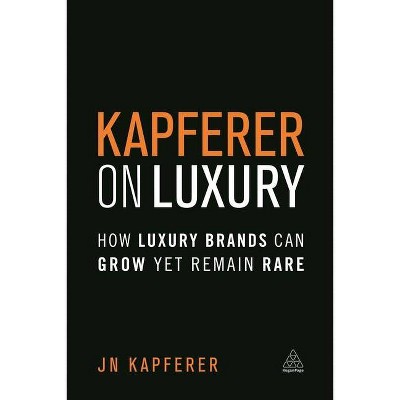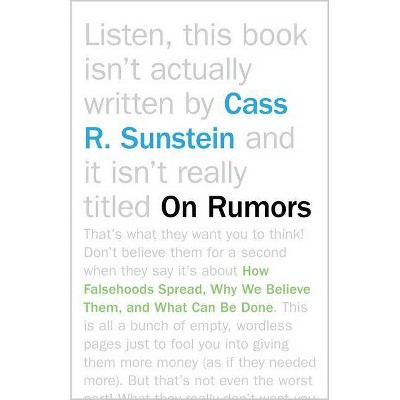Rumors - by Jean-Noel Kapferer (Paperback)

Similar Products
Products of same category from the store
AllProduct info
<p/><br></br><p><b> About the Book </b></p></br></br>Rumors may be the oldest medium of mass communication of information or ideas<p/><br></br><p><b> Book Synopsis </b></p></br></br><p>Rumors may be the oldest medium of mass communication of information or ideas. Even before there were newspapers, radio, or television, rumors communicated by word-of-mouth made and shattered reputations, and set off riots and wars. Yet contrary to predictions, rumors continue to thrive, in spite of and parallel to mass media.</p><p>What accounts for the puzzling persistence and continuing significance of this little-studied social phenomenon? Jean-No;el Kapferer examines the theory and practice of rumors, focusing on specific areas such as entertainment, criminal behavior, business and finance, and politics. He describes the kinds of conditions that give birth to rumors, why we believe them, and the hidden messages they convey. Kapferer points out that rumors frequently serve useful social purposes and present rich examples. He speculates about how rumors can be controlled, changed, and prevented.</p><p>Drawing upon contributions of disciplines ranging from psychology to history, and integrating the insights of Europeans with the latest work of American researchers, this is the most comprehensive examination of rumors, gossip, and urban legends yet published. Translated into nine languages, this edition was updated with advances in theory and research since the book's original French publication in 1987. Its brisk, accessible style makes the book of interest to psychologists, economists, political scientists, sociologists, and folklore analysts, as well as the general reader who is curious about the origins of this fascinating social phenomenon.</p><p/><br></br><p><b> Review Quotes </b></p></br></br><br>-Jean-NoEl Kapferer has written a serious and scholarly treatise on rumor, and one that is . . . filled with good sense . . . Books on rumor, like their topic, prove never to be the last words, but, like this one, they include words worth heeding.-</p> --Gary Alan Fine, <em>The Public Opinion Quarterly</em></p> -This book, originally published in French in 1987, is a comprehensive, systematic, and fascinating analysis of the rumor process from sociological and social psychological points of view . . . [T]his book constitutes a significant step forward in understanding rumor and a major contribution to collective behavior theory. Because of its style and abundant use of illustrative cases, it should be rewarding reading . . . No student of collective behavior can afford not to devote considerable time and thought to this work.-</p> --Ralph H. Turner, <em>Contemporary Sociology</em></p> -[Kapferer] breaks with the Allport-Postman convention and redefines rumor, how rumors proliferate, their interpretations, and their functions in news gathering and management, criminal investigations, popular culture, the workplace, marketplace, stock market, and political arena . . . As a work in political communication Kapferer's book complements the growing emphasis on mediated politics, constructions of political spectacle, fantasy theory, and accommodation theory . . . The result is a volume that not only reconceptualizes the study of rumor in promising ways, but proves to be refreshingly entertaining as well.-</p> --Dan Nimmo, <em>Social Science Quarterly</em></p> -[An] engaging and well-organized review of research on the processes and effects of rumors.-</p> --Jonathan Schroeder, <em>Journal of Macromarketing</em></p><br><br>"Jean-NoEl Kapferer has written a serious and scholarly treatise on rumor, and one that is . . . filled with good sense . . . Books on rumor, like their topic, prove never to be the last words, but, like this one, they include words worth heeding."</p> --Gary Alan Fine, <em>The Public Opinion Quarterly</em></p> "This book, originally published in French in 1987, is a comprehensive, systematic, and fascinating analysis of the rumor process from sociological and social psychological points of view . . . [T]his book constitutes a significant step forward in understanding rumor and a major contribution to collective behavior theory. Because of its style and abundant use of illustrative cases, it should be rewarding reading . . . No student of collective behavior can afford not to devote considerable time and thought to this work."</p> --Ralph H. Turner, <em>Contemporary Sociology</em></p> "[Kapferer] breaks with the Allport-Postman convention and redefines rumor, how rumors proliferate, their interpretations, and their functions in news gathering and management, criminal investigations, popular culture, the workplace, marketplace, stock market, and political arena . . . As a work in political communication Kapferer's book complements the growing emphasis on mediated politics, constructions of political spectacle, fantasy theory, and accommodation theory . . . The result is a volume that not only reconceptualizes the study of rumor in promising ways, but proves to be refreshingly entertaining as well."</p> --Dan Nimmo, <em>Social Science Quarterly</em></p> "[An] engaging and well-organized review of research on the processes and effects of rumors."</p> --Jonathan Schroeder, <em>Journal of Macromarketing</em></p><br><br>"Jean-Noel Kapferer has written a serious and scholarly treatise on rumor, and one that is . . . filled with good sense . . . Books on rumor, like their topic, prove never to be the last words, but, like this one, they include words worth heeding." --Gary Alan Fine, The Public Opinion Quarterly "This book, originally published in French in 1987, is a comprehensive, systematic, and fascinating analysis of the rumor process from sociological and social psychological points of view . . . [T]his book constitutes a significant step forward in understanding rumor and a major contribution to collective behavior theory. Because of its style and abundant use of illustrative cases, it should be rewarding reading . . . No student of collective behavior can afford not to devote considerable time and thought to this work." --Ralph H. Turner, Contemporary Sociology "[Kapferer] breaks with the Allport-Postman convention and redefines rumor, how rumors proliferate, their interpretations, and their functions in news gathering and management, criminal investigations, popular culture, the workplace, marketplace, stock market, and political arena . . . As a work in political communication Kapferer's book complements the growing emphasis on mediated politics, constructions of political spectacle, fantasy theory, and accommodation theory . . . The result is a volume that not only reconceptualizes the study of rumor in promising ways, but proves to be refreshingly entertaining as well." --Dan Nimmo, Social Science Quarterly "[An] engaging and well-organized review of research on the processes and effects of rumors." --Jonathan Schroeder, Journal of Macromarketing<br>
Price History
Price Archive shows prices from various stores, lets you see history and find the cheapest. There is no actual sale on the website. For all support, inquiry and suggestion messages communication@pricearchive.us



















